 le 11 au 15 décembre 2023
le 11 au 15 décembre 2023Upcoming Dates
- December 18-January 2 – Winter break, NO SCHOOL
- Wednesday, January 3 – Students return to school
Personal Safety Lessons
This week we’ll be going through the district’s Personal Safety lessons based on Erin’s Law lessons provided through Second Steps Curriculum. Links to parent information letters for the lessons are here.
We will cover lessons 1-4 this week and next: Ways to Stay Safe, Always Ask First, Unsafe & Unwanted Touches, Private Body Parts Rule.
What’s up! Quoi de neuf?
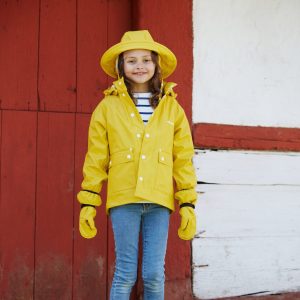 Please send your child to school in proper footwear and a WARM water-repellent jacket with a hood or a hat when the weather is rainy. It’s getting cold, too, so please have your child wear warmer layers. Thank you!
Please send your child to school in proper footwear and a WARM water-repellent jacket with a hood or a hat when the weather is rainy. It’s getting cold, too, so please have your child wear warmer layers. Thank you!
If your child is ill or has had a fever or vomited within the previous 24 hours, please keep your child home. If your child will be absent, please email both teachers (kincaid_j@4j.lane.edu and hopper_s@4j.lane.edu) and please call in and leave a message on the school attendance line (541) 790-7080 or email Eliza at drummond_e@4j.lane.edu.
Please ensure that you email BOTH TEACHERS when you communicate with us.
Le français:
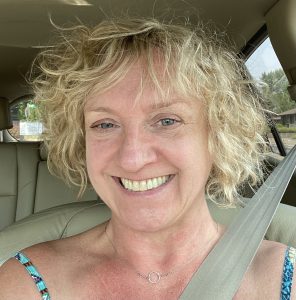
Mme Jana kincaid_j@4j.lane.edu French & science teacher
Thank you so much to the many parents who notified us about absences last week. We really appreciate it!
No French homework until 2024! We continue to correct two horrible sentences on all full days, and alphabetize on our short day (The alphabetizing includes vocabulary words and we’re also sorting by letters that make the sound we’re studying). We have completed all uppercase letters in cursive, so this coming week, we’ll work on our signatures, and on correcting fossilized writing errors. We had a lot of absences this past week which contributed to our not completing everything I was hoping to complete. This week, we’re going to work on some winter (l’hiver) art projects.
Students took a quiz on Friday on this past week’s French vocabulary words and will bring it home on Monday. I did something I don’t usually do, which is I used the sentences from the homework. I knew I would see improved scores, but the average in the two classes averaged out to 98%. With two bonus points available, the highest possible score is 110%, which a few kids achieved. So, if your child comes home with a white half-sheet of paper, that means he/she/they took the quiz with no assistance. If your child comes home with a full-page yellow sheet, he/she/they took the quiz with the words provided, which is totally fine, no penalty. However, if your child did not do well on a yellow sheet, that means they did poorly with assistance (all the words spelled out) on sentences they’ve already done during that week. If that is the case, then it may be time for a tutor. I asked afterward, and a number of students said it wasn’t challenging enough with the same sentences, so I will probably do a mix like I usually do when we return to French vocabulary quizzes in the year 2024!
Student goal: I am applying myself to my school work. I am actively seeking learning.
Student goal: I can correct grammatical and punctuation errors in sentences in French.
Student goal: I can form and connect all the lowercase and some of the uppercase letters correctly in cursive.
Student goal: I am expanding my vocabulary by incorporating new words into my speaking and writing.
Buddies!
This past week, we got together with our buddies and they talked about the fun things they do over winter break, and the traditions they have in their families. This week, we are going to make a little polar bear card art project together.
Les sciences:

 We took our glass bottles out of the freezer, and the water had expanded (dilatée) to the point that there was a long tube of water sticking out of the of-course-broken bottle where it had broken the seal on the cap and expanded out that way. It was pretty cool. We also began learning about chemical weathering, including how pollution (la pollution) causes acid rain (la pluie acide) and the room will smell delightfully of vinegar for weeks! We put four kinds of stones, basalt (le basalte), limestone (le calcaire), marble (le marbre), and sandstone (le grès) in vinegar, and we’ll observe the effects of vinegar on the stones. The vinegar mimics acid rain in this experiment, so we got to see a good chemical reaction with the limestone. Now, they’re noticing that crystals are beginning to form on some of the rocks. Now why would that be?
We took our glass bottles out of the freezer, and the water had expanded (dilatée) to the point that there was a long tube of water sticking out of the of-course-broken bottle where it had broken the seal on the cap and expanded out that way. It was pretty cool. We also began learning about chemical weathering, including how pollution (la pollution) causes acid rain (la pluie acide) and the room will smell delightfully of vinegar for weeks! We put four kinds of stones, basalt (le basalte), limestone (le calcaire), marble (le marbre), and sandstone (le grès) in vinegar, and we’ll observe the effects of vinegar on the stones. The vinegar mimics acid rain in this experiment, so we got to see a good chemical reaction with the limestone. Now, they’re noticing that crystals are beginning to form on some of the rocks. Now why would that be?
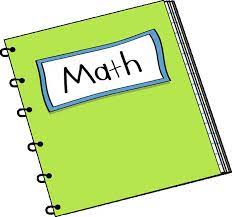
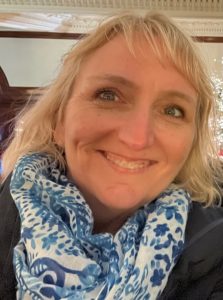
Mme Shelli hopper_s@4j.lane.edu English & Math teacher
Math
This week’s Key Concepts:
- We can identify fractions of a whole.
- We can construct a whole given any fractional part of that whole.
- Fractions can be decomposed (broken) into smaller fractions in more than one way.
- Mixed numbers are a form of numbers greater than 1 that have a whole that can be decomposed in many different ways.
There is MATH review HOMEWORK on Monday and Tuesday ONLY.
We started our first fraction unit last week. We reviewed the definition of fraction as well as key vocabulary such as numerator, denominator, mixed number, and improper fraction. This week’s problem solving will involve placing fractions on a number line. It is challenging for many students to clearly communicate their thinking about fractions using illustrations. Students are tasked to make number lines that feature equally proportioned fractions and to clearly label their drawings with labels, color, and words to communicate their thinking. This goes beyond simply writing an equation or the final answer to a task.
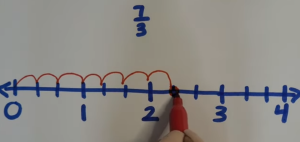
 English
English
We are last week of our Oregon Geography unit. Last week, students created mini flip books about 5 main regions of Oregon. This week, students will learn about the nine federally recognized tribes in Oregon. We’ll go through portions of lessons written by the Grande Ronde Tribe, and we’ll watch some videos of people sharing traditional lifeways of Indigenous people including basket making and native languages. To wrap up our geography of Oregon, Students will do a little research about traditional ways of life (lifeways) of people in the different regions. Students’ geography books will be brought home early in January to share with you.
Guest speaker:
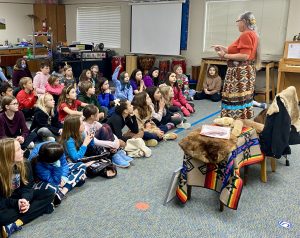
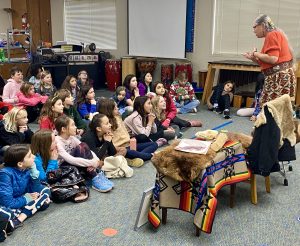
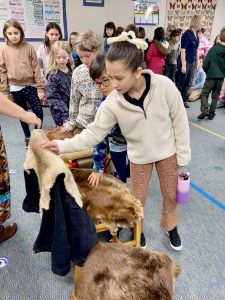 Dr. Brenda Brainard came on Wednesday to tell stories from her tribe. She told the story of Beaver an how he got a flat tail. Kids got to feel about six different beaver pelts.
Dr. Brenda Brainard came on Wednesday to tell stories from her tribe. She told the story of Beaver an how he got a flat tail. Kids got to feel about six different beaver pelts.
Chamber Music visit:
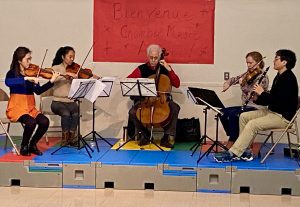
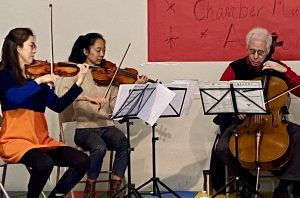
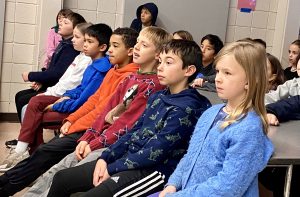
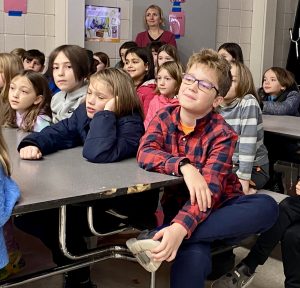 The group Chamber Music Amici came to school on Friday, and we had the first concert we’ve had in the cafeteria since before Covid! It was a 20-minute concert, the group played Brahms, and the kids enjoyed it a lot. They were a respectful audience.
The group Chamber Music Amici came to school on Friday, and we had the first concert we’ve had in the cafeteria since before Covid! It was a 20-minute concert, the group played Brahms, and the kids enjoyed it a lot. They were a respectful audience.
Field Trip Photos
Thank you to the parents who joined us for our field trip to UO Museum of Natural and Cultural History. Here are some photos of our time in the Archaeology Detectives class:
Red Class Photos Blue Class Photos
Calling on Host Families!
Bonjour Charlemagne families,
Our Amity interns are a huge part of our school. Thanks to them, teachers in grades 2-5 can differentiate their instruction and students can experience more French speaking. We could not do this program without host families who agree to host them for about 3 months. There is always a need for more families.
The requirements are:
– Transporting the intern to and from school,
– Offering her own room,
– Offering 3 meals a day
The host families don’t have to be part of our Charlemagne community. So tell friends, neighbors, family members.
If you have an interest in hosting, please reach out to our host family coordinator, Rachel Buciarski (Charlemagne parent) at rachel@buciarski.com.
Merci beaucoup!
Aurelie Sion (she/her)
2ème année
Write a Comment
You must be logged in to post a comment.